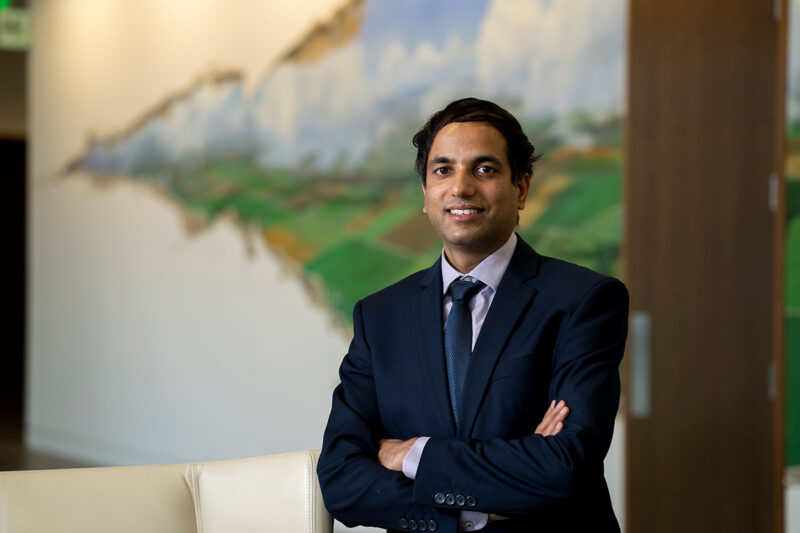
Aditya Khanal originally hails from a pocket of Nepal where citrus — in particular, mandarins and sweet oranges — grew plentifully. As a young boy on his grandfather’s farm, he remembers the local producers having a surplus of fruit but lacking the proper channels to sell it outside their small village.
Witnessing as a child that lost earning potential and its repercussions for the farmers’ families had a lasting effect on him. It was then that Khanal first recognized the importance of market connections in the world of agriculture. Today, he works as an agricultural and applied economist who studies the complex interplay between producers and consumers.
“My family wanted me to be a medical doctor, but I realized that food and agri-food systems have no less scope than medicine,” says Khanal, who serves as an associate professor in the College of Agriculture’s Department of Agricultural and Environmental Sciences at Tennessee State University. “Ultimately, food is related to public health and nutrition.”
His research primarily focuses on agricultural finance and risk management of farm households in both the United States and Nepal. On the producer side, he investigates factors that influence farm households’ decisions about topics including diversification, technology adoption, government programs, and food safety. And on the consumer side, he examines the drivers of food demand and consumer behavior.
His recent studies have explored why and how enterprises like agritourism could benefit small U.S. farms, how credit constraint affects small U.S. farm’s performance, the willingness of citrus farmers in Nepal to pay for crop insurance, and whether precision farming with a GPS guidance system met cotton producers’ expectations.
“As an applied economist, I’m interested in the practices that would help both farmers and consumers,” he says. “I try to investigate their decision-making behavior, and then analyze and quantify how that decision is related to the impacts on outcomes like food security, incomes, and economic status.”
Khanal is currently leading a project titled “Market-led food safety in Nepal: Harnessing production incentives and consumer awareness,” funded by the Feed the Future Innovation Lab for Food Safety. Food safety is an emerging priority in Nepal, where there have been limitations in designing and enforcing strict food production policy regulations. The prevalence of foodborne pathogens like E. coli and Salmonella remains a critical problem, particularly in fresh produce, frequently leading to illness in both adults and children.
At the same time, inadequate food consumption and low dietary diversity contribute to undernutrition in Nepali households. Increasing access to nutrient-dense foods, including salad vegetables typically consumed raw, can remedy this issue — but only if the high risk of foodborne illness is eliminated.
The two-year project aims to stimulate a rapid increase in access to nutritious produce in Nepal by identifying the factors that will drive the supply and demand of safer salad vegetables. The hope is that determining the current barriers to produce safety will serve as a foundation for strategic policies and investment to transform the vegetable value chain.
Khanal and colleagues at Arizona State University, Nepal’s Agriculture and Forestry University, and SAHAVAGI have already completed the first part of the study: surveying consumers about their food safety awareness and willingness to pay for safer produce. They now plan to shift focus to the growers, collecting data on their current food safety practices and willingness to take on additional costs for a safer product.
“For the parties involved in every food system to anticipate economic sustainability, there should be some incentives for everyone,” says Khanal. “So, I try to do research on how best we can incentivize different economic agents. This project is about understanding the drivers for the adoption of safer practices among growers, as well as the consumer consciousness and their willingness to pay for food safety.”
The team will also provide food safety and health hazard reduction training to small- and medium-sized vegetable farms, specifically targeting youth and women entrepreneurs. The project will culminate in a stakeholder workshop with government officials and private businesses on prioritizing food safety strategies and informed investment decisions.
Khalan’s path to applied economics began with an undergraduate degree in agricultural sciences at Nepal’s Tribhuvan University in 2006. He then attended Louisiana State University (LSU) for master’s and Ph.D. degrees in agricultural economics. He also received a master’s degree in finance from LSU and another in economics from Virginia Tech. After his Ph.D., he started a tenure-track faculty position at Tennessee State University.
Despite living in the U.S. for almost 15 years now, Khanal maintains strong connections to his home country. He frequently visits Nepal to conduct research and present at conferences, while also keeping in close touch with family members, former classmates, and colleagues. Ultimately, the goal of his research is to find and implement strategies across the food system that will benefit all involved parties and promote safer food production and consumption.
“What I love is impact-oriented research. For me, an equally important aspect in research is to communicate and publish so that others can apply the findings,” says Khanal. “In the end, science should have some meaningful effect on stakeholders like the farmers and consumers. That’s my philosophy.”
Meeri Kim is a freelance writer with the Feed the Future Innovation Lab for Food Safety.

